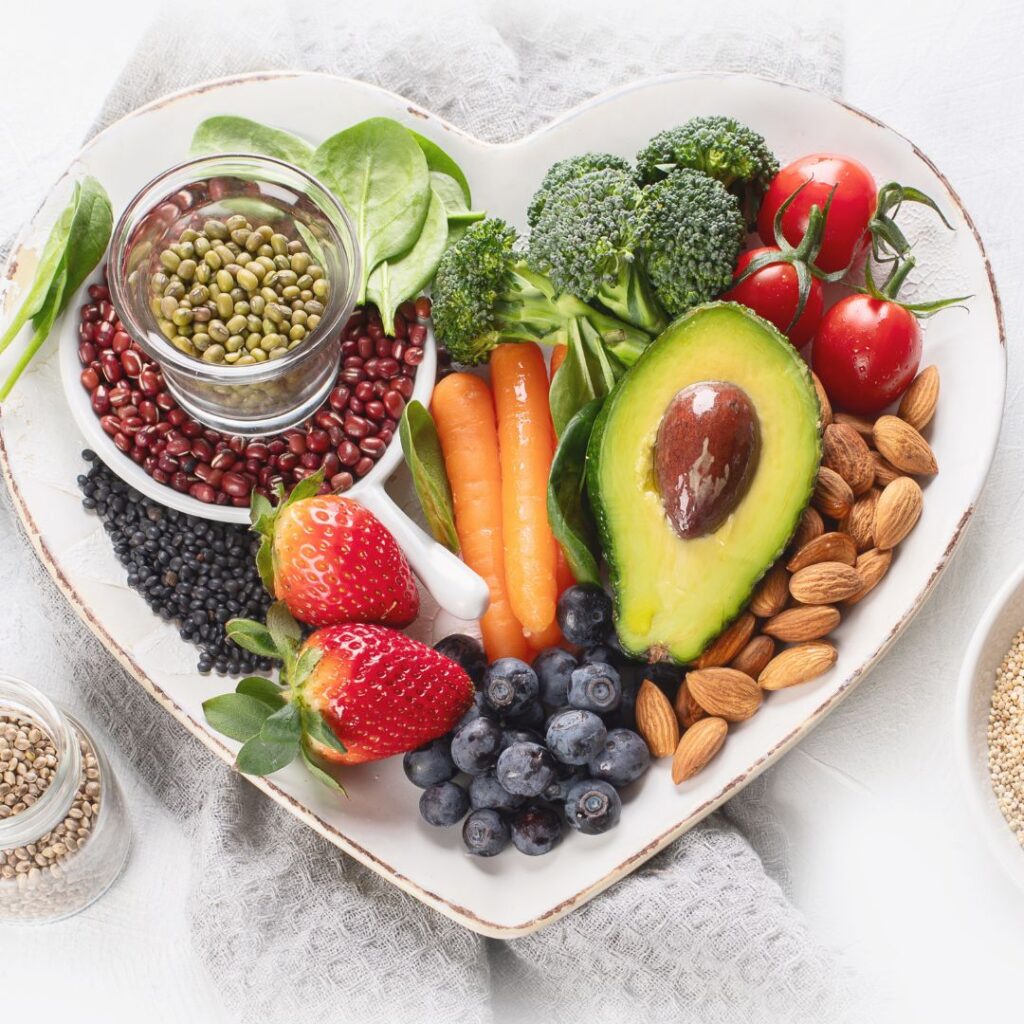Easy & Simple Steps to Transition Towards a Plant-Based Lifestyle!
Having a plant-based lifestyle is very trendy right now. What is the actual big fuss about?
We are becoming more conscious of our health and our environment. Going towards a plant-based lifestyle is not only helping our body to become healthier, but it is also helping our beloved Mother Earth. Transitioning is like “Killing two birds with one stone” or shall we say, “Feeding two birds with one scone”? It does require some educating, prepping, and planning; “when you don’t plan, you plan to fail,” so equip yourself with the necessary tools you need to thrive in this new lifestyle.
Plant-based or plant-forward eating patterns focus on foods primarily from plants, including not only fruits and vegetables but also nuts, seeds, oils, whole grains, legumes, and beans. It doesn’t necessarily mean that you have to label yourself as vegetarian or vegan. Still, it does mean you are conscious about your health, body, the environment, and the animals. But a plant-based lifestyle doesn’t have to be only about your food and diet; it can also be about your overall life goals, daily habits, and routines. Although different, dieting and lifestyle changes have a common ground and purpose, the most significant difference between the two is that dieting is a short-term process and a lifestyle change is long-term and can be echoed in every aspect of your existence.
So many benefits!
Many people are getting interested and are starting their transition towards a healthier lifestyle because of its many advantages. There are several significant benefits to moving to plant-based nutrition, all supported by excellent science.
Healthwise, these benefits include:
-
Lower cholesterol
-
Life expectancy
-
Higher energy throughout the day
-
Help to clear skin issues
-
Promote healthier hair and nails
-
Can help with better sleep patterns and exhaustion
-
Easier weight management
-
Disease prevention
-
Higher libido
-
Delayed fatigue and increased stamina
-
May benefit from a 15% lower risk of developing cancer
-
Reduces symptoms of arthritis such as pain, joint swelling, and morning stiffness
-
May reduce the risk of poor kidney function
-
May help reduce the risk of developing Alzheimer’s disease
Learning new vocabulary
The most common plant-based lifestyle label is “vegan.” Sadly, nowadays, the word vegan might scare people off, especially in the passionate and dedicated animal rights activists community. This is why now, the term “Plant-Based” is being used more often. You do not have to label yourself, but the word vegan describes well what this lifestyle is all about. As described by the Vegan Society, “veganism is the practice of minimizing harm to all animals by abstaining from animal products such as meat, fish, dairy, eggs, honey, gelatin, lanolin, wool, fur, silk, suede, and leather. It is more than a diet; it is a way of living that seeks to exclude all forms of exploitation and cruelty to animals for food, clothing, or any other purpose. To technically be vegan would mean no down comforters, no wool socks, no honey, no gelatin-based candy, and of course, no eating dairy, eggs, meat, or fish. ” You can also say that you are now adopting a whole food or plant-based lifestyle.
According to the Beginner’s Guide to a Plant-Based Diet, from the Forks over Knives website, whole foods describe natural foods that are not heavily processed. That means whole, unrefined, or minimally refined ingredients. Plant-based means food that comes from plants and doesn’t include animal ingredients such as meat, milk, eggs, or honey.
The plant-based diets have five food groups:
-
Fruits: Any fruit types, including apples, bananas, grapes, strawberries, citrus fruits, etc.
-
Vegetables: Plenty of veggies, including peppers, corn, lettuce, spinach, kale, peas, collards, etc.
-
Tubers: Root vegetables like potatoes, carrots, parsnips, sweet potatoes, beet, etc.
-
Whole grains: Grains, cereals, and other starches in their unmodified form, such as quinoa, brown rice, millet, whole wheat, oats, barley, etc. Even popcorn is a whole grain.
-
Legumes: Beans of any kind, plus lentils, pulses, etc.
You can have so much fun trying new plant-based diets and find out which one is best for you, your body, and your health! The different types of diets include:
-
Raw vegan: vegan food that has not been cooked above 104 Fahrenheit
-
Gluten-Free Vegan
-
Whole Food Vegan
-
Fruitarian: mainly fruits
-
Junk Food Vegan: adopting this diet only for the sake of the animals and eat lots of vegan burgers and vegan ice cream
-
Raw till 4 Vegan: raw food until 4 pm
-
Paleo Vegan (Pegan): what vegan cavemen would have eaten
-
Freegan: vegan food they find for free
Awareness is “the state of being conscious of something.”
People decide to become vegan for different reasons. Most of the time, it is because they have awakened their awareness of their bodies, higher self, and health. They also understand our environment’s fragility and the importance of its protection. You can choose to go vegan for;
-
Ethical reasons: going cruelty-free and expressing compassion for every sentient being, knowing that animals are sentient creatures that feel fear and pain and have a right to live, for the pure and unconditional love of animals, animal lovers fighting for animal rights
-
Health reasons: improving digestion, concentration, sleep patterns, mood, energy, and overall health issues, connecting with your body and inner self
-
Environmental reasons: saving the planet and conserving natural resources, living a greener lifestyle doing their bit for the planet, helping to reduce greenhouse gas emissions, minimize their contribution to deforestation and reduce pollution by not supporting animal agriculture
-
Religious purposes: choosing a vegan diet due to their spiritual beliefs, as”you shall do no harm, and love thy neighbor as yourself” and being against any form of violence
Transitioning to a plant-based lifestyle!
You might feel a bit overwhelmed by all the information out there about how to start your new lifestyle! But not to worry, let’s break it down, shall we!
-
Know your why! Be sure of why you are deciding to transition towards this lifestyle: compassion, love, self-care, health, a new challenge, etc.
-
Get ready! Take notes and plan the next steps of your journey.
-
Get inspired! Read books and articles about the many benefits and ways of transitioning to a plant-based lifestyle, find new fun recipes to make at home, watch videos, films, and documentaries such as
-
Cowspiracy
-
What the Health
-
Fast Food Nation
-
The Game Changers
-
Fat, Sick, and Nearly Dead
-
Vegucated
-
Food, inc.
-
The End of Meat
-
Okja
-
Forks over Knives
-
Food Choices
-
Eating You Alive
-
Live and Let Live
-
Earthlings
-
Maximum Tolerated Dose
-
Called to Rescue
-
Eating Animals
-
Dominion
-
A Prayer for Compassion
-
Blackfish
-
Running for Good
-
-
Prep time! Make sure you have all your nutrients and foods ready at home (proteins, carbs, greens, fruits, beans, substitutes, etc.) Make a list of what you’re missing for your next trip to the grocery store. Food that you can eat:
-
Fruits and vegetables
-
Beans
-
Lentils
-
Tofu
-
Seitan
-
Tempeh
-
Nuts
-
Seeds
-
Noodles and pasta
-
Nut butter
-
Substitutes! We’ve never had these many substitute choices available to us than right now! It is such a great time to start transitioning! You can find substitutes for butter, milk (oat, almond, soy, cashew, macadamia, etc.), cheese, cooking cream, ice cream, chocolate, meat (“chicken”, “beef”, “ham”, “pepperoni”, “salami”, “fish”), etc.
-
-
Lunching at work and snack time! Make sure you prep meals before going to work, not to be stuck with no plant-based options for lunch. You can always add these to your lunchbox:
-
Fresh fruit with a dollop of nut butter
-
Hummus and vegetables
-
Nutritional yeast sprinkled on popcorn
-
Roasted chickpeas
-
Nut and fruit bars
-
Trail mix
-
Chia pudding
-
Homemade muffins
-
Whole-wheat pita with salsa and guacamole
-
Cereal with plant milk
-
Edamame
-
Whole-grain crackers and cashew nut spread
-
A plant-milk latte or cappuccino
-
Dried seaweed snacks
-
-
Going to the restaurant. Before heading out with friends or date night with your partner, make sure to look at the menus and all available options. You don’t have to eat a tasteless green salad or ice cubes when you go out.
-
Going to family events. Make sure to prep in advance, and bring your own meal if you have to. You can even make extra portions to share with your family and introduce them to your new lifestyle. Who knows who’ll end up inspiring!
-
If you are an athlete, find new and healthy recipes full of all the nutrients you need and get inspired by other vegan athletes such as
-
Lewis Hamilton
-
Rich Roll
-
Patrick Baboumian
-
Georges Laraque
-
Heather Mitts
-
DeAndre Jordan
-
Tia Blanco
-
Meagan Duhamel
-
-
Becoming more ethical and eco-friendly! Your body is not the only thing that can benefit from a plant-based lifestyle; your living space too. You can start looking into cruelty-free, organic, clean, and natural products to add to your home. From laundry detergent to window spray to beauty and hygiene products, you can find a multitude of products and brands. You can even make them yourself and become a pro at DIY products.
Remember, this is a journey, not a destination. It’s “progress over perfection.” Keep educating yourself and find pleasure in creating a new lifestyle that you love! Start by reducing your meat consumption and get inspired to cook your own plant-based meals. Reduce your dairy consumption and look for substitutes that you like. Be confident in your why, listen to what your body needs and wants, seek the help you might need along the way, and above all, have fun trying new challenges!

